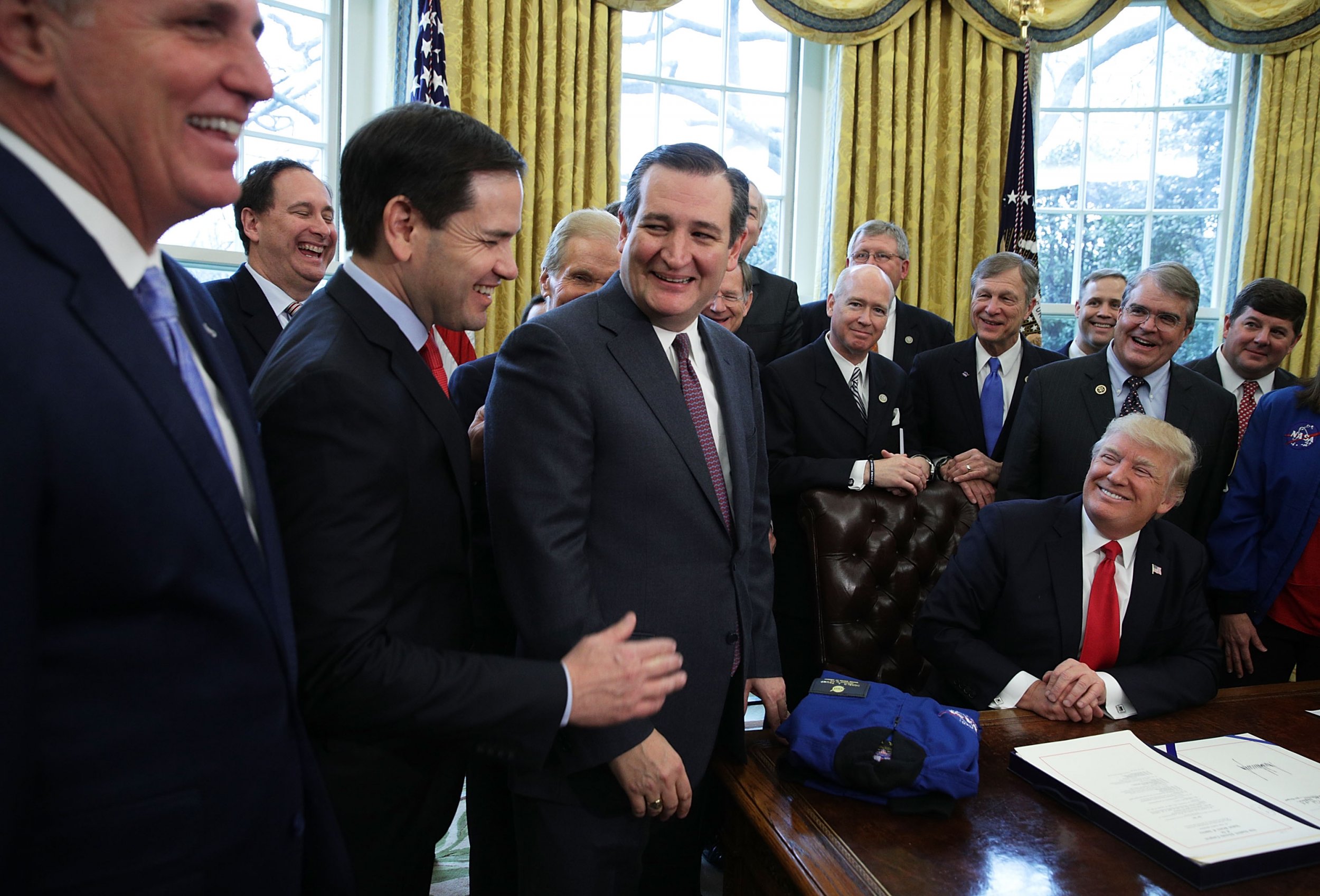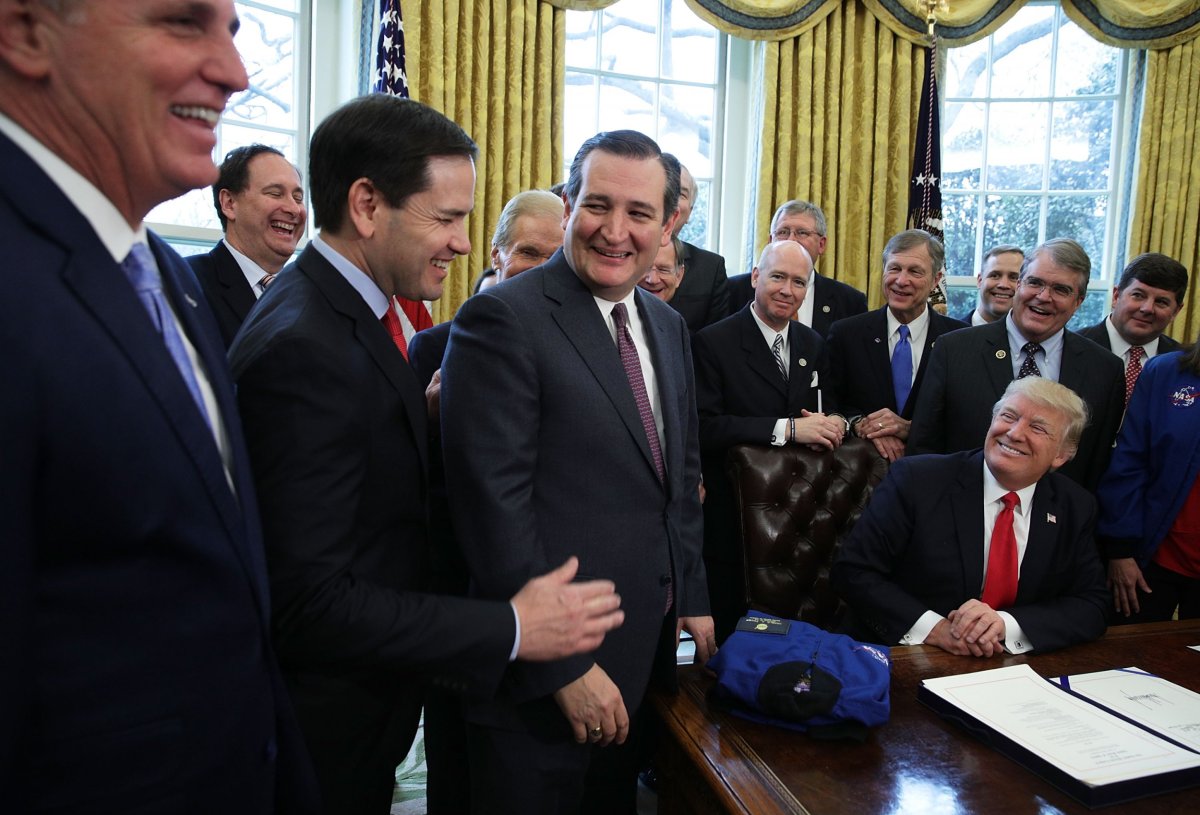
President Donald Trump appeals to men with fragile masculinity, two researchers from New York University wrote in analysis published in The Washington Post. They also said Republican candidates facing a Democrat drew more support in areas with higher levels of fragile masculinity in 2018 House races.
The president has touted his masculinity since declaring he would run for office. After Marco Rubio insinuated the president had a small penis in 2016, Trump raised his hands and said "he referred to my hands -- 'if they're small, something else must be small.' I guarantee you there's no problem. I guarantee."
He frequently calls other political figures weak and has promoted his bravery, saying after the Parkland school shooting that "I really believe I'd run in there even if I didn't have a weapon." He espouses visions of toughness, like cheering hard football hits, and promotes shows of strength, like his proposed military parade.

NYU Psychology professor Eric Knowles and doctoral student Sarah DiMuccio queried 300 men on Amazon's crowdsourcing platform Mechanical Turk to discover whether they had or would search for terms such as "erectile dysfunction," "how to get girls," "penis enlargement," "testosterone," and "Viagra," among others.
They discovered a high level of concern about masculinity "was strongly associated with interest in these search topics."
They then correlated the geopgrahic dispersion of these search topics in 2016 with how such areas voted in that year's election, finding "that support for Trump in the 2016 election was higher in areas that had more searches for topics such as 'erectile dysfunction.' Moreover, this relationship persisted after accounting for demographic attributes in media markets, such as education levels and racial composition, as well as searches for topics unrelated to fragile masculinity, such as 'breast augmentation' and 'menopause.'"
The researchers also checked relations between fragile masculinity and voting in 2008 and 2012, finding "that the correlation of fragile masculinity and voting in presidential elections was distinctively stronger in 2016" than it was when John McCain and Mitt Romney were Republican presidential candidates.
Similarly, in the over 390 House races which featured a Republican versus a Democrat, Republicans gained more support in areas with elevated search levels of terms related to fragile masculinity. "However, there was no significant relationship between fragile masculinity and voting in the 2014 or 2016 congressional elections. This suggests that fragile masculinity has now become a stronger predictor of voting behavior."
Knowles and DiMuccio noted that their findings should be considered with caveats. They said that fragile masculinity didn't decrease support for female candidates in 2018.
The researchers wrote that "the research reported here is correlational. We can't be entirely sure that fragile masculinity is causing people to vote in a certain way. However, given that experimental work has identified a causal connection between masculinity concerns and political beliefs, we think the correlations we've identified are important."
They also noted that they cannot say whether fragile masculinity will guide voting after Trump is no longer a prominent political force.
Trump earned 52 percent of male votes and 41 percent of female votes in the 2016 presidential election, according to Edison Media Research exit polling. He performed well among white men and women. Non-white individuals favored Hillary Clinton by large margins.
Uncommon Knowledge
Newsweek is committed to challenging conventional wisdom and finding connections in the search for common ground.
Newsweek is committed to challenging conventional wisdom and finding connections in the search for common ground.
About the writer
Daniel Moritz-Rabson is a breaking news reporter for Newsweek based in New York. Before joining Newsweek Daniel interned at PBS NewsHour ... Read more
To read how Newsweek uses AI as a newsroom tool, Click here.








